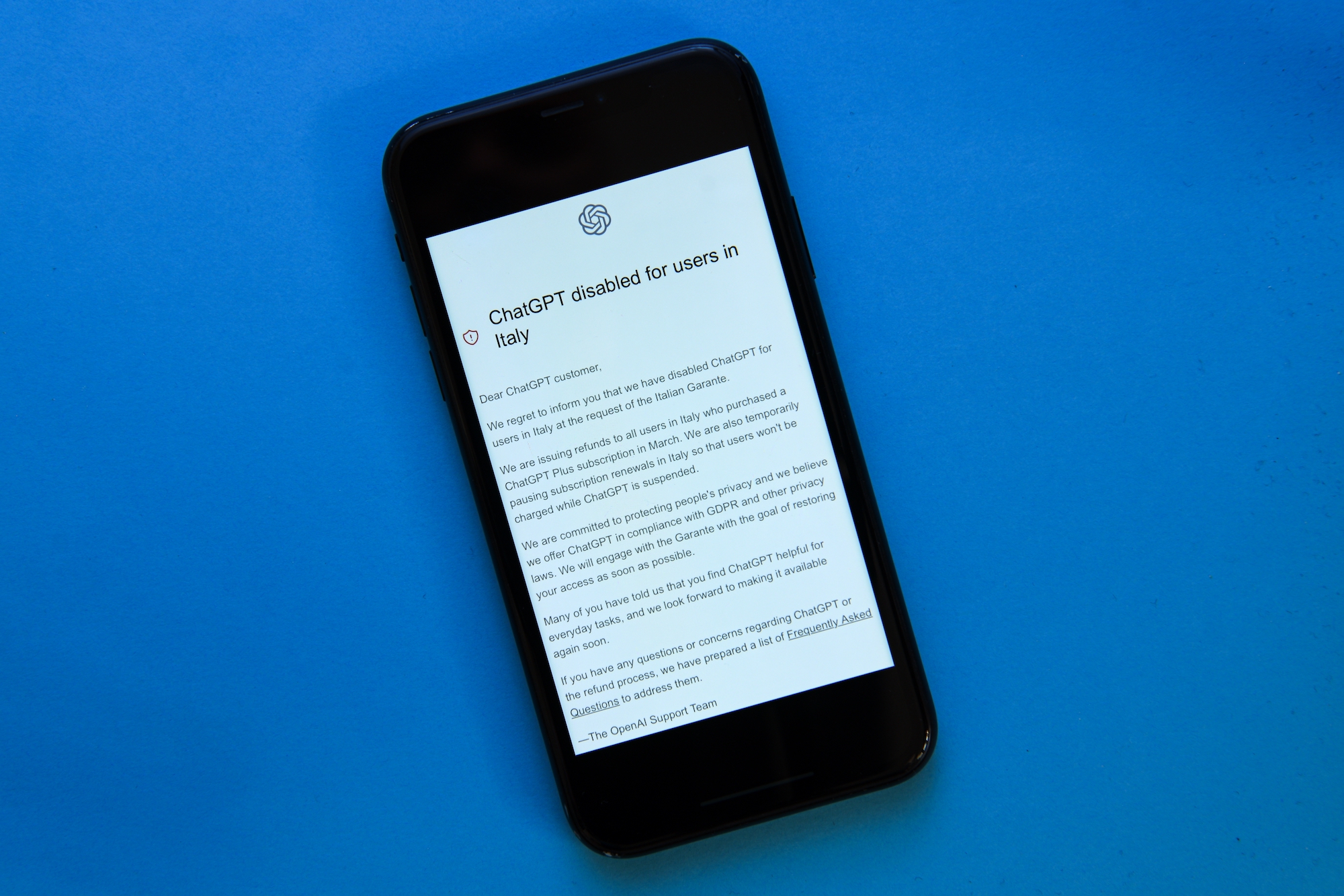SEO
Exploring Italy’s ChatGPT Ban And Its Potential Impact

Imagine logging in to your most valuable business tool when you arrive at work, only to be greeted by this:
“ChatGPT disabled for users in Italy
Dear ChatGPT customer,
We regret to inform you that we have disabled ChatGPT for users in Italy at the request of the Italian Garante.”
OpenAI gave Italian users this message as a result of an investigation by the Garante per la protezione dei dati personali (Guarantor for the protection of personal data). The Garante cites specific violations as follows:
- OpenAI did not properly inform users that it collected personal data.
- OpenAI did not provide a legal reason for collecting personal information to train its algorithm.
- ChatGPT processes personal information inaccurately without the use of real facts.
- OpenAI did not require users to verify their age, even though the content ChatGPT generates is intended for users over 13 years of age and requires parental consent for those under 18.
Effectively, an entire country lost access to a highly-utilized technology because its government is concerned that personal data is being improperly handled by another country – and that the technology is unsafe for younger audiences.
Diletta De Cicco, Milan-based Counsel on Data Privacy, Cybersecurity, and Digital Assets with Squire Patton Boggs, noted:
“Unsurprisingly, the Garante’s decision came out right after a data breach affected users’ conversations and data provided to OpenAI.
It also comes at a time where generative AIs are making their ways into the general public at a fast pace (and are not only adopted by tech-savvy users).
Somewhat more surprisingly, while the Italian press release refers to the recent breach incident, there is no reference to that in the Italian decision to justify the temporary ban, which is based on: inaccuracy of the data, lack of information to users and individuals in general, missing age verification for children, and lack of legal basis for training data.”
Although OpenAI LLC operates in the United States, it has to comply with the Italian Personal Data Protection Code because it handles and stores the personal information of users in Italy.
The Personal Data Protection Code was Italy’s main law concerning private data protection until the European Union enacted the General Data Protection Regulation (GDPR) in 2018. Italy’s law was updated to match the GDPR.
What Is The GDPR?
The GDPR was introduced in an effort to protect the privacy of personal information in the EU. Organizations and businesses operating in the EU must comply with GDPR regulations on personal data handling, storage, and usage.
If an organization or business needs to handle an Italian user’s personal information, it must comply with both the Italian Personal Data Protection Code and the GDPR.
How Could ChatGPT Break GDPR Rules?
If OpenAI cannot prove its case against the Italian Garante, it may spark additional scrutiny for violating GDPR guidelines related to the following:
- ChatGPT stores user input – which may contain personal information from EU users (as a part of its training process).
- OpenAI allows trainers to view ChatGPT conversations.
- OpenAI allows users to delete their accounts but says that they cannot delete specific prompts. It notes that users should not share sensitive personal information in ChatGPT conversations.
OpenAI offers legal reasons for processing personal information from European Economic Area (which includes EU countries), UK, and Swiss users in section nine of the Privacy Policy.
The Terms of Use page defines content as the input (your prompt) and output (the generative AI response). Each user of ChatGPT has the right to use content generated using OpenAI tools personally and commercially.
OpenAI informs users of the OpenAI API that services using the personal data of EU residents must adhere to GDPR, CCPA, and applicable local privacy laws for its users.
As each AI evolves, generative AI content may contain user inputs as a part of its training data, which may include personally sensitive information from users worldwide.
Rafi Azim-Khan, Global Head of Data Privacy and Marketing Law for Pillsbury Winthrop Shaw Pittman LLP, commented:
“Recent laws being proposed in Europe (AI Act) have attracted attention, but it can often be a mistake to overlook other laws that are already in force that can apply, such as GDPR.
The Italian regulator’s enforcement action against OpenAI and ChatGPT this week reminded everyone that laws such as GDPR do impact the use of AI.”
Azim-Khan also pointed to potential issues with sources of information and data used to generate ChatGPT responses.
“Some of the AI results show errors, so there are concerns over the quality of the data scraped from the internet and/or used to train the tech,” he noted. “GDPR gives individuals rights to rectify errors (as does CCPA/CPRA in California).”
What About The CCPA, Anyway?
OpenAI addresses privacy issues for California users in section five of its privacy policy.
It discloses the information shared with third parties, including affiliates, vendors, service providers, law enforcement, and parties involved in transactions with OpenAI products.
This information includes user contact and login details, network activity, content, and geolocation data.
How Could This Affect Microsoft Usage In Italy And The EU?
To address concerns with data privacy and the GDPR, Microsoft created the Trust Center.
Microsoft users can learn more about how their data is used on Microsoft services, including Bing and Microsoft Copilot, which run on OpenAI technology.
Should Generative AI Users Worry?
“The bottom line is this [the Italian Garante case] could be the tip of the iceberg as other enforcers take a closer look at AI models,” says Azim-Khan.
“It will be interesting to see what the other European data protection authorities will do,” whether they will immediately follow the Garante or rather take a wait-and-see approach,” De Cicco adds. “One would have hoped to see a common EU response to such a socially sensitive matter.”
If the Italian Garante wins its case, other governments may begin to investigate more technologies – including ChatGPT’s peers and competitors, like Google Bard – to see if they violate similar guidelines for the safety of personal data and younger audiences.
“More bans could follow the Italian one,” Azim-Khan says. At “a minimum, we may see AI developers having to delete huge data sets and retrain their bots.”
OpenAI recently updated its blog with a commitment to safe AI systems.
Featured image: pcruciatti/Shutterstock
SEO
Executive Director Of WordPress Resigns

Josepha Haden Chomphosy, Executive Director of the WordPress Project, officially announced her resignation, ending a nine-year tenure. This comes just two weeks after Matt Mullenweg launched a controversial campaign against a managed WordPress host, which responded by filing a federal lawsuit against him and Automattic.
She posted an upbeat notice on her personal blog, reaffirming her belief in the open source community as positive economic force as well as the importance of strong opinions that are “loosely held.”
She wrote:
“This week marks my last as the Executive Director of the WordPress project. My time with WordPress has transformed me, both as a leader and an advocate. There’s still more to do in our shared quest to secure a self-sustaining future of the open source project that we all love, and my belief in our global community of contributors remains unchanged.
…I still believe that open source is an idea that can transform generations. I believe in the power of a good-hearted group of people. I believe in the importance of strong opinions, loosely held. And I believe the world will always need the more equitable opportunities that well-maintained open source can provide: access to knowledge and learning, easy-to-join peer and business networks, the amplification of unheard voices, and a chance to tap into economic opportunity for those who weren’t born into it.”
Turmoil At WordPress
The resignation comes amidst the backdrop of a conflict between WordPress co-founder Matt Mullenweg and the managed WordPress web host WP Engine, which has brought unprecedented turmoil within the WordPress community, including a federal lawsuit filed by WP Engine accusing Mullenweg of attempted extortion.
Resignation News Was Leaked
The news about the resignation was leaked on October 2nd by the founder of the WordPress news site WP Tavern (now owned by Matt Mullenweg), who tweeted that he had spoken with Josepha that evening, who announced her resignation.
He posted:
“I spoke with Josepha tonight. I can confirm that she’s no longer at Automattic.
She’s working on a statement for the community. She’s in good spirits despite the turmoil.”
Screenshot Of Deleted Tweet
Josepha tweeted the following response the next day:
“Ok, this is not how I expected that news to come to y’all. I apologize that this is the first many of you heard of it. Please don’t speculate about anything.”
Rocky Period For WordPress
While her resignation was somewhat of an open secret it’s still a significant event because of recent events at WordPress, including the resignations of 8.4% of Automattic employees as a result of an offer of a generous severance package to all employees who no longer wished to work there.
Read the official announcement:
Featured Image by Shutterstock/Wirestock Creators
SEO
8% Of Automattic Employees Choose To Resign

WordPress co-founder and Automattic CEO announced today that he offered Automattic employees the chance to resign with a severance pay and a total of 8.4 percent. Mullenweg offered $30,000 or six months of salary, whichever one is higher, with a total of 159 people taking his offer.
Reactions Of Automattic Employees
Given the recent controversies created by Mullenweg, one might be tempted to view the walkout as a vote of no-confidence in Mullenweg. But that would be a mistake because some of the employees announcing their resignations either praised Mullenweg or simply announced their resignation while many others tweeted how happy they are to stay at Automattic.
One former employee tweeted that he was sad about recent developments but also praised Mullenweg and Automattic as an employer.
He shared:
“Today was my last day at Automattic. I spent the last 2 years building large scale ML and generative AI infra and products, and a lot of time on robotics at night and on weekends.
I’m going to spend the next month taking a break, getting married, and visiting family in Australia.
I have some really fun ideas of things to build that I’ve been storing up for a while. Now I get to build them. Get in touch if you’d like to build AI products together.”
Another former employee, Naoko Takano, is a 14 year employee, an organizer of WordCamp conferences in Asia, a full-time WordPress contributor and Open Source Project Manager at Automattic announced on X (formerly Twitter) that today was her last day at Automattic with no additional comment.
She tweeted:
“Today was my last day at Automattic.
I’m actively exploring new career opportunities. If you know of any positions that align with my skills and experience!”
Naoko’s role at at WordPress was working with the global WordPress community to improve contributor experiences through the Five for the Future and Mentorship programs. Five for the Future is an important WordPress program that encourages organizations to donate 5% of their resources back into WordPress. Five for the Future is one of the issues Mullenweg had against WP Engine, asserting that they didn’t donate enough back into the community.
Mullenweg himself was bittersweet to see those employees go, writing in a blog post:
“It was an emotional roller coaster of a week. The day you hire someone you aren’t expecting them to resign or be fired, you’re hoping for a long and mutually beneficial relationship. Every resignation stings a bit.
However now, I feel much lighter. I’m grateful and thankful for all the people who took the offer, and even more excited to work with those who turned down $126M to stay. As the kids say, LFG!”
Read the entire announcement on Mullenweg’s blog:
Featured Image by Shutterstock/sdx15
SEO
YouTube Extends Shorts To 3 Minutes, Adds New Features

YouTube expands Shorts to 3 minutes, adds templates, AI tools, and the option to show fewer Shorts on the homepage.
- YouTube Shorts will allow 3-minute videos.
- New features include templates, enhanced remixing, and AI-generated video backgrounds.
- YouTube is adding a Shorts trends page and comment previews.
-

 WORDPRESS3 days ago
WORDPRESS3 days agoWordPress biz Automattic details WP Engine deal demands • The Register
-
SEARCHENGINES5 days ago
Daily Search Forum Recap: September 30, 2024
-

 SEO7 days ago
SEO7 days agoYoast Co-Founder Suggests A WordPress Contributor Board
-

 SEARCHENGINES6 days ago
SEARCHENGINES6 days agoGoogle Volatility With Gains & Losses, Updated Web Spam Policies, Cache Gone & More Search News
-

 SEO7 days ago
SEO7 days ago6 Things You Can Do to Compete With Big Sites
-
SEARCHENGINES4 days ago
Daily Search Forum Recap: October 1, 2024
-

 SEO6 days ago
SEO6 days agoAn In-Depth Guide For Businesses
-

 AFFILIATE MARKETING6 days ago
AFFILIATE MARKETING6 days agoNvidia CEO Jensen Huang Praises Nuclear Energy to Power AI














